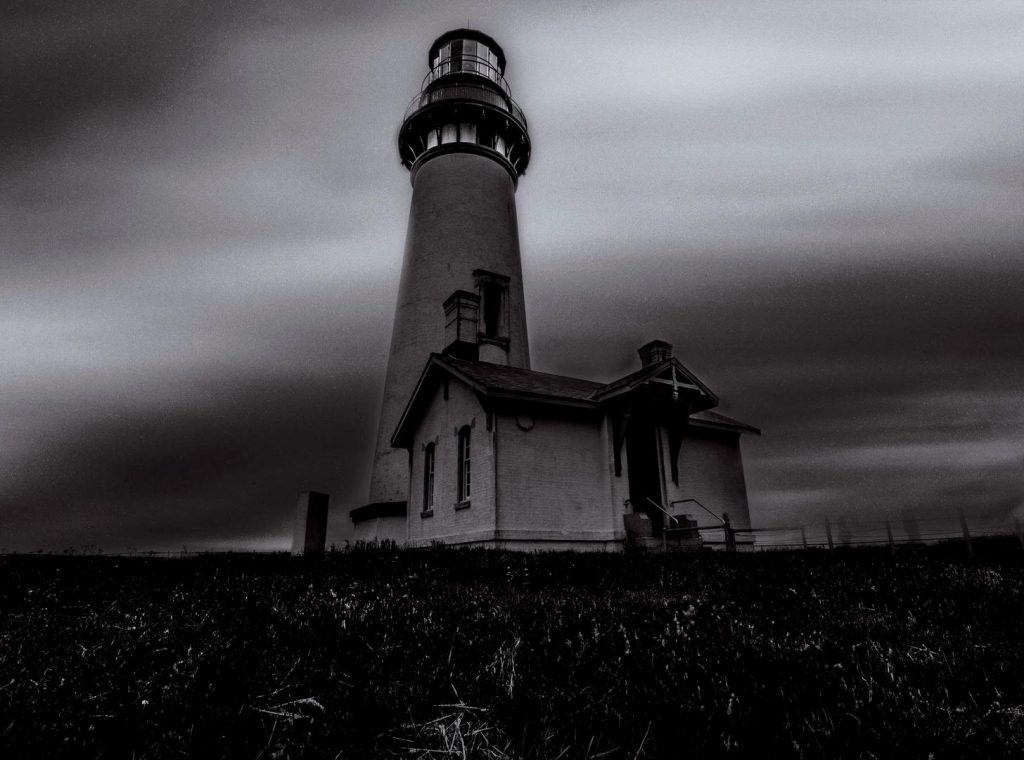“Want to get away from it all? We offer you…Escape!
Seventy-years ago today, in 1947, the CBS Radio Network decided to complement its celebrated “outstanding theatre of thrills” with an anthology “designed to free you from the four walls of today with a half-hour of high adventure.” That’s the fundamental difference between Suspense and Escape (the latter celebrating its 70th anniversary). Suspense concentrated on tales of crime and mystery, with the protagonist of each tale placed in a situation that kept the listener on the edge of their seat. Escape certainly had its fair share of “suspense,” but its broadcasts leaned more toward action.
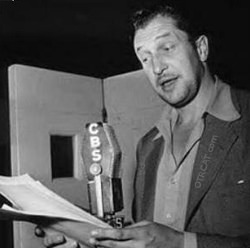 The other major difference between the two series was that Suspense, under the direction of creator William Spier (and later Anton Leader and Elliott Lewis), served as a showcase for the crème de la crème of Hollywood stars. Suspense paraded the likes of Cary Grant, James Stewart, Barbara Stanwyck, and Olivia de Havilland before its microphones…while poor relation Escape could only afford the occasional film star in Victor Mature or Gary Merrill—or movie actors who already had a solid background in the aural medium, like Jeff Chandler or Vincent Price. Escape overcame its lack of star wattage with some of the very best radio actors to ever pick up a script, including legends like Ben Wright, Harry Bartell, John Dehner, Parley Baer, and Lawrence Dobkin.
The other major difference between the two series was that Suspense, under the direction of creator William Spier (and later Anton Leader and Elliott Lewis), served as a showcase for the crème de la crème of Hollywood stars. Suspense paraded the likes of Cary Grant, James Stewart, Barbara Stanwyck, and Olivia de Havilland before its microphones…while poor relation Escape could only afford the occasional film star in Victor Mature or Gary Merrill—or movie actors who already had a solid background in the aural medium, like Jeff Chandler or Vincent Price. Escape overcame its lack of star wattage with some of the very best radio actors to ever pick up a script, including legends like Ben Wright, Harry Bartell, John Dehner, Parley Baer, and Lawrence Dobkin.
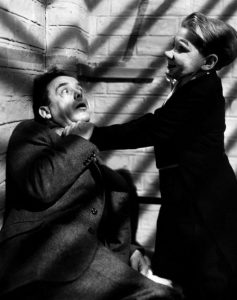 The origins of Escape can be loosely traced to an NBC series broadcast from 1944-45 as Stories of Escape, with a format similar to the later CBS series. The CBS version began as a February 28, 1947 audition for a show that was to be titled Out of This World, which reworked one of the segments that had been featured in the 1945 British horror anthology film Dead of Night, in which a ventriloquist’s dummy seems to have a life of its own. This toned-down version of the tale would also be utilized for Escape’s official audition (dated March 21, 1947), and featured World’s actors Berry Kroeger and Art Carney.
The origins of Escape can be loosely traced to an NBC series broadcast from 1944-45 as Stories of Escape, with a format similar to the later CBS series. The CBS version began as a February 28, 1947 audition for a show that was to be titled Out of This World, which reworked one of the segments that had been featured in the 1945 British horror anthology film Dead of Night, in which a ventriloquist’s dummy seems to have a life of its own. This toned-down version of the tale would also be utilized for Escape’s official audition (dated March 21, 1947), and featured World’s actors Berry Kroeger and Art Carney.
Not long after its July 7th premiere, Radio Life noted that the title of Escape was a misnomer. “These stories all possess many times the reality that radio writing conveys,” the publication gushed in August of 1947. Escape drew upon a treasure trove of short stories penned by such literary luminaries as F. Scott Fitzgerald (“The Diamond as Big as the Ritz”), Joseph Conrad (“Typhoon”), Robert Louis Stevenson (“The Sire de Maletroit’s Door”), Sir Arthur Conan Doyle (“The Ring of Thoth”), H.G. Wells (“Pollack and the Porrah Man”), and Rudyard Kipling (“The Man Who Would Be King”). The show’s producer, William N. Robson, also contributed an original tale on occasion (“Operation Fleur de Lis”), but for the most part the program generously helped itself to established published tales, adapted by such renowned radio scribes as Les Crutchfield, John Dunkel, Walter Newman, and James Poe.
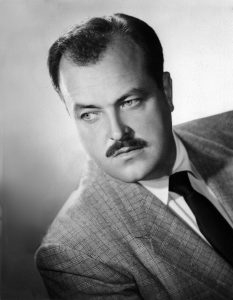 Escape had one of radio’s most unforgettable openings: “Tired of the everyday grind? Ever dream of a life of romantic adventure? Want to get away from it all? We offer you… Escape!” These lines would be spoken by either William Conrad or Paul Frees (they alternated from week to week), but the two actors could also be pressed into service playing roles within the productions. (Conrad did some of his best radio work in Escape showcases like “Wild Oranges” and “Snake Doctor.”) In later years, actor Lou Krugman was “the voice of Escape.” After hearing the orchestra launch into Modest Mussorgsky’s Night on Bald Mountain, the announcer would authoritatively intone something along the lines of: “You are alone and unarmed in the green Hell of the Caribbean jungle…you are being trailed by a pack of hungry dogs and a mad hunter armed for the kill…” This was a recurring theme of Escape—that the protagonist was on his own and at the mercy of the elements, often relying on his wits to survive.
Escape had one of radio’s most unforgettable openings: “Tired of the everyday grind? Ever dream of a life of romantic adventure? Want to get away from it all? We offer you… Escape!” These lines would be spoken by either William Conrad or Paul Frees (they alternated from week to week), but the two actors could also be pressed into service playing roles within the productions. (Conrad did some of his best radio work in Escape showcases like “Wild Oranges” and “Snake Doctor.”) In later years, actor Lou Krugman was “the voice of Escape.” After hearing the orchestra launch into Modest Mussorgsky’s Night on Bald Mountain, the announcer would authoritatively intone something along the lines of: “You are alone and unarmed in the green Hell of the Caribbean jungle…you are being trailed by a pack of hungry dogs and a mad hunter armed for the kill…” This was a recurring theme of Escape—that the protagonist was on his own and at the mercy of the elements, often relying on his wits to survive.
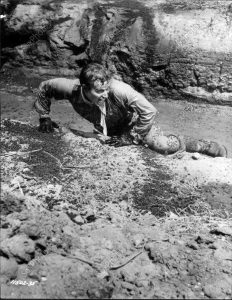 Despite its modest budget, and some reluctance on the part of the Columbia Broadcasting System to promote the series, Escape quickly became a firm favorite with radio audiences. CBS treated the show like a shell game, shifting the program around in eighteen different time slots before the program eventually left the airwaves on September 25, 1954. The show was also mostly sustained during its time on the air (apart from Richmond Oil paying the bills from April to August 1950). Even though its cast and crew were probably working for peanuts, everyone involved was dedicated to putting out an exemplary show. This was evident in the acting, writing, and production values of each broadcast. Escape has been responsible for so many memorable radio memories: “Leinengen vs. the Ants,” “Three Skeleton Key,” “A Shipment of Mute Fate,” and much, much more.
Despite its modest budget, and some reluctance on the part of the Columbia Broadcasting System to promote the series, Escape quickly became a firm favorite with radio audiences. CBS treated the show like a shell game, shifting the program around in eighteen different time slots before the program eventually left the airwaves on September 25, 1954. The show was also mostly sustained during its time on the air (apart from Richmond Oil paying the bills from April to August 1950). Even though its cast and crew were probably working for peanuts, everyone involved was dedicated to putting out an exemplary show. This was evident in the acting, writing, and production values of each broadcast. Escape has been responsible for so many memorable radio memories: “Leinengen vs. the Ants,” “Three Skeleton Key,” “A Shipment of Mute Fate,” and much, much more.
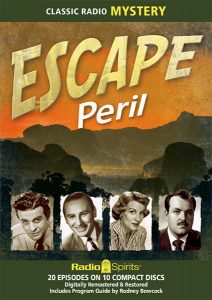 Radio Spirits’ collection Escape Essentials showcases several of the classic broadcasts mentioned in the preceding paragraphs, and even a few of my favorites like “Casting the Runes” (you may recognize this as the inspiration for the classic 1958 horror film Night of the Demon) and “Poison.” I didn’t write the liner notes for this set, but I did contribute the booklet for The Hunted and the Haunted, and I can highly recommend two additional Escape compendiums in Escape to the High Seas and Peril—all four of these collections are indispensable listening for old-time radio fans. To cleanse your palate, you’ll also find Escape in our potpourri sets of Great Radio Horror (“The Fall of the House of Usher,” “The Golden Snake,” “The Abominable Snowman”) and Science Fiction Radio: Atom Age Adventures (“Conqueror’s Isle,” “North of Polaris”). When you have a craving for high adventure, Escape is the only remedy—ask for it by name!
Radio Spirits’ collection Escape Essentials showcases several of the classic broadcasts mentioned in the preceding paragraphs, and even a few of my favorites like “Casting the Runes” (you may recognize this as the inspiration for the classic 1958 horror film Night of the Demon) and “Poison.” I didn’t write the liner notes for this set, but I did contribute the booklet for The Hunted and the Haunted, and I can highly recommend two additional Escape compendiums in Escape to the High Seas and Peril—all four of these collections are indispensable listening for old-time radio fans. To cleanse your palate, you’ll also find Escape in our potpourri sets of Great Radio Horror (“The Fall of the House of Usher,” “The Golden Snake,” “The Abominable Snowman”) and Science Fiction Radio: Atom Age Adventures (“Conqueror’s Isle,” “North of Polaris”). When you have a craving for high adventure, Escape is the only remedy—ask for it by name!

